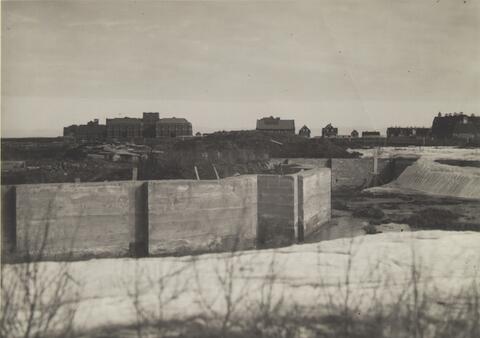
Zone du titre et de la mention de responsabilité
Titre propre
City Hospital - Construction
Dénomination générale des documents
- Document graphique
Titre parallèle
Compléments du titre
Mentions de responsabilité du titre
Notes du titre
Niveau de description
Pièce
Cote
Zone de l'édition
Mention d'édition
Mentions de responsabilité relatives à l'édition
Zone des précisions relatives à la catégorie de documents
Mention d'échelle (cartographique)
Mention de projection (cartographique)
Mention des coordonnées (cartographiques)
Mention d'échelle (architecturale)
Juridiction responsable et dénomination (philatélique)
Zone des dates de production
Date(s)
-
16 Mar. 1914 (Production)
Zone de description matérielle
Description matérielle
1 photograph : b&w ; 16.5 x 12.2 cm
Zone de la collection
Titre propre de la collection
Titres parallèles de la collection
Compléments du titre de la collection
Mention de responsabilité relative à la collection
Numérotation à l'intérieur de la collection
Note sur la collection
Zone de la description archivistique
Nom du producteur
Historique de la conservation
Portée et contenu
View looking south of the contagious disease hospital site on the southeast corner of Cumberland Avenue and College Street (now Drive). Old Engineering Building at left; University (Main) Barn at right.
Bio/Historical ote: The City Hospital is the earliest of our 'not built' examples. In 1911 the City of Saskatoon approached the university about the possibility of building a hospital on campus. It was felt that until hospital facilities were fully developed on campus, the university would not move to establish a College of Medicine. The Board of Governors replied favourably and negotiations were opened. The first hurdle to be cleared was the question of location. The City asked for a site on the riverbank. The University wanted the land for itself, having recently turned down a similar request by the theological colleges. A site southeast of what is now College and Cumberland was agreed upon. The eight-acre parcel of land was to be leased for 49 years at a cost of $5 per annum with an option for another 49 years. The style of the architecture and material of construction had to be approved by the Board of Governors and, with the establishment of a College of Medicine, the University reserved the right to nominate one-half of the physicians and surgeons in attendance at the public wards of the hospital. On 12 December 1911, a referendum asked citizens to choose a site for a new hospital and approve a $300,000 expenditure for the construction. The money was approved and the university site won by a two-to-one margin over its alternative in City Park. Architects were engaged, sketches submitted and an excavation contract was signed in October 1912. The original funds proved to be inadequate. Another $185,000 was asked for and approved by the ratepayers but was never spent. The combination of a sagging economy, accelerating costs and World War I stalled and eventually ended the project. The city opted for the cheaper alternative of an addition to the City Park facility. The excavated hole remained a visible reminder of the failed scheme until 1932, when on Sunday, May 8, an eight year old boy drowned in the flooded pit when he fell from a raft he and his friends had built. Plans to fill-in the site were subsequently made.
Zone des notes
État de conservation
Source immédiate d'acquisition
Classement
Langue des documents
Écriture des documents
Localisation des originaux
Disponibilité d'autres formats
Restrictions d'accès
Délais d'utilisation, de reproduction et de publication
Photographer: Unknown
Copyright holder: Unknown
Other terms: Responsibility regarding questions of copyright that may arise in the use of any images is assumed by the researcher.
Instruments de recherche
Éléments associés
Accruals
Location note
Vol. 6

